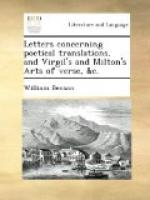[Greek: Sun de duo marpsas,
hos te phulakas poti gaie / Kopt’]
Hom.
Odyss. _&c._
“Two of my hapless Friends
with all his Pow’r,
Like Dogs, the Monster on the rocky Floor
DASH’D.—
Can any body be insensible of the Power of this Word, Dash’d, as it is here plac’d.
I remember an Instance of this Monosyllable Collocation at the Beginning of a Line in rhym’d Verse, which is very well worth inserting here. It is at the Conclusion of Mr. Pit’s 4th AEneid, when Juno sends Iris from Heaven in haste to relieve Dido from the Agonies of Death.
"Tum Juno Omnipotens, longum miserata
dolorem,
Difficilesque obitus, Irim Demisit
Olympo
Quae luctantem animam, nexosque resolveret
artus.
“Then mighty Juno with a melting Eye, Beheld her dreadful Anguish from the Sky; And bade fair Iris from the starry Pole, Fly, and enlarge her agonizing Soul.
How is the Verse animated by the placing that Monosyllable, Fly, at the Beginning of the last Line.—The Reader sees all the Concern of Juno, and all the Hurry she is in to get the unhappy Queen released from the Pangs of Death.
Milton likewise uses his Monosyllables very artfully in placing them at the Conclusion of a Line, so as to divide the last Foot of the Verse, which has a very extraordinary Effect.
“Silence, ye troubled Waves, and
thou, Deep,
Peace.
Again he divides the last Foot by making a Monosyllable the Beginning of a new Sentence, which is very pleasing.
“—Up flood the Corny Reed Imbattled in his Plain, the humble Furz And Bush with frisled Hair implicit. Last Rose as in Dance the stately Trees.
Milton also sometimes places two Monosyllables at the End of the Line, stopping at the 4th Foot, to adapt the Measure of the Verse to the Sense; and then begins the next Line in the same manner, which has a wonderful Effect.
“Now at their shady Lodge arriv’d,
both stopt,
Both turn’d, and under open
Sky ador’d
The God who made, _&c._
This artful Manner of writing makes the Reader see them Stop and Turn to worship God before they went into their Bower. If this Manner was alter’d, much of the Effect of the Painting would be lost.
“And now arriving at their shady
Lodge
Both stopt, both turn’d,
and under open Sky
Ador’d the God, _&c._
This falls very short of the Original. So in Latin,
“Jamq; domus ventum est umbrosae
ad limina: sistunt
Ambo, ambo vertunt, & aperto numen
adorant
Sub Coelo.—
Alter these Lines, thus,
“Et nunc Arborei ventum est ad
limina tecti;
Sistunt Ambo, Ambo vertunt, & numen
Adorant
Sub Coelo.—




